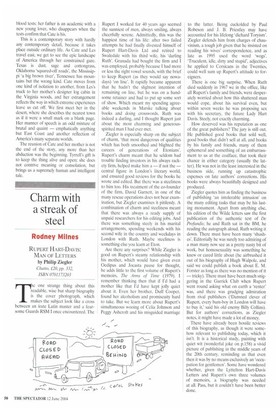Charm with a streak of steel
Rodney MiInes
RUPERT HART-DAVIS: MAN OF LETTERS by Philip Ziegler Chatto, .£20, pp. 332, ISBN 0701173203 Tione strange thing about this readable, wise but sharp biography s the cover photograph, which makes the subject look like a cross between an irate Latin master and a fearsome Guards RSM I once encountered. The Rupert I worked for 40 years ago seemed the sunniest of men, always smiling, always cheerfully serene. Admittedly, this was the happiest time of his life: after two failed attempts he had finally divested himself of Rupert Hart-Davis Ltd and retired to Swaledale with his third wife, his 'darling Ruth'. Granada had bought the firm and I was employed, probably because I had more or less the right vowel sounds, with the brief to keep Rupert (as they would say nowadays) 'on line'. It rapidly became apparent that he hadn't the slightest intention of remaining on line, but he was on a handsome retainer and had to put up some sort of show. Which meant my spending agreeable weekends in Marske talking about books and doing crosswords. Ruth was indeed a darling, and I thought Rupert just about the most charming and generousspirited man I had ever met. Ziegler is especially sharp on the subject of charm, 'that most dangerous of qualities which has both smoothed and blighted the careers of generations of Etonians'. Rupert's charm meant that he seldom had trouble finding investors in his always rackety firm, helped make him a — if not the — central figure in London's literary world, and ensured good reviews for the books he wrote and edited. But there was a steeliness to him too. His treatment of the co-founder of the firm, David Garnett, in one of the many rescue operations does not bear examination, but Ziegler examines it pitilessly. A combination of charm and steeliness meant that there was always a ready supply of unpaid researchers for his editing jobs. And there was something steely in his marital arrangements, spending weekends with his second wife in the country and weekdays in London with Ruth. Maybe steeliness is something else you learn at Eton. Are there any surprises? While Ziegler is good on Rupert's steamy relationship with his mother, which would have given even Oedipus and Jocasta pause for thought, he adds little to the first volume of Rupert's memoirs, The Arms of Time (1979). I remember thinking then that if I'd had a mother like that I'd have kept jolly quiet about it. Even her brother, Duff Cooper, found her alcoholism and promiscuity hard to take. But we learn more about Rupert's simultaneous wooing of Celia Johnson and Peggy Ashcroft and his misguided marriage to the latter. Being cuckolded by Paul Robeson and J. B. Priestley may have accounted for his lifelong 'diehard Toryism'. Ziegler defends him from charges of chauvinism, a tough job given that he insisted on reading his wives' correspondence, and as late as 1995 used the word 'wogs'. 'Truculent, idle, dirty and stupid', adjectives he applied to Corsicans in the Twenties, could well sum up Rupert's attitude to foreigners. There is one big surprise. When Ruth died suddenly in 1967 we in the office, like all Rupert's family and friends, were desperately worried about how this shattered man would cope, about his survival even, but within seven weeks he was proposing sex with his secretary, the future Lady Hart Davis. Steely, not exactly charming. How deserved was his reputation as one of the great publishers? The jury is still out. He published good books that sold well, good books that didn't sell at all, and books by his family and friends, many of them ephemeral and something of an embarrassment to us at the coalface, that took their chance in either category (usually the latter). He was not in the least interested in the business side, running up catastrophic expenses on late authors' corrections. His books were always beautifully designed and produced. Ziegler quotes him as finding the business of publishing 'an intolerable intrusion' on the many editing tasks that may be his lasting monument. Apart from anything else, his edition of the Wilde letters saw the first publication of the authentic text of De Profundis; he and Ruth sat in the BM, he reading the autograph aloud, Ruth writing it down. There must have been many 'shushes'. Editorially he was surely too admiring of a man many now see as a pretty nasty bit of work, but homosexuality was something he knew or cared little about (he airbrushed it out of his biography of Hugh Walpole, and said we could publish a book about E. M. Forster as long as there was no mention of it — tricky). There must have been much sniggering in the Garrick Club when Rupert went round asking what on earth a 'renter' was, and there was grudging admiration from rival publishers (`Damned clever of Rupert, every bum-boy in London will have to buy it,' said his old enemy Billy Collins). But for authors' corrections, as Ziegler notes, it might have made a lot of money. There have already been hostile reviews of this biography, as though it were somehow relevant to publishing today, which it isn't. It is a historical study, painting with quiet wit (wonderful joke on p.158) a vivid picture of publishing in the middle years of the 20th century, reminding us that even then it was by no means exclusively an 'occupation for gentlemen'. Some have wondered whether, given the Lyttelton Hart-Davis Letters and Rupert's own three volumes of memoirs, a biography was needed at all. Pass, but it couldn't have been better done.


















































































 Previous page
Previous page